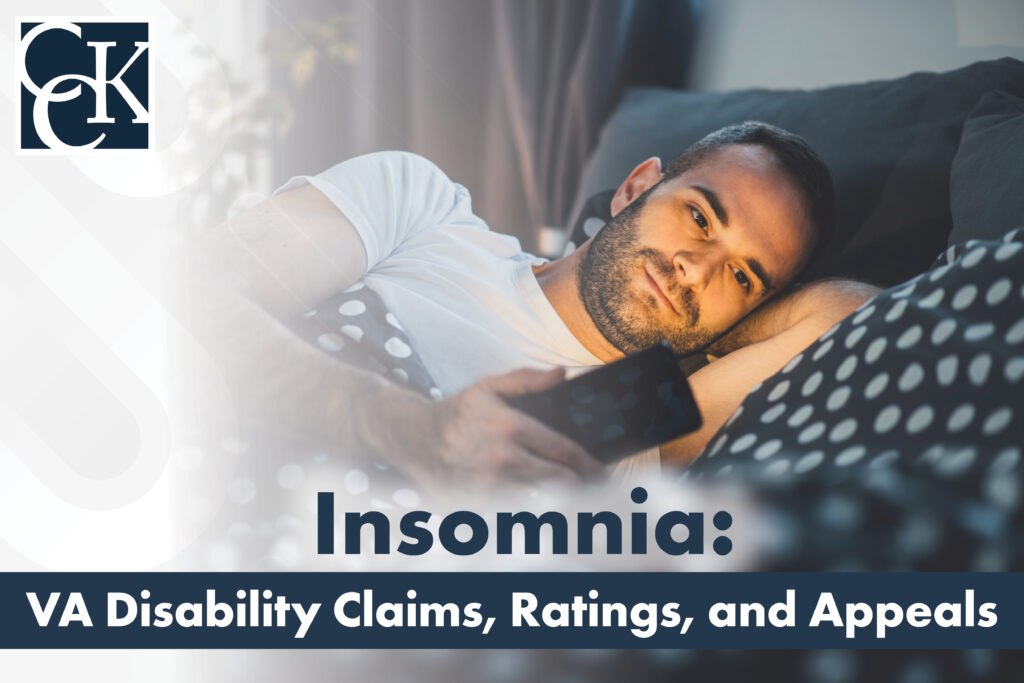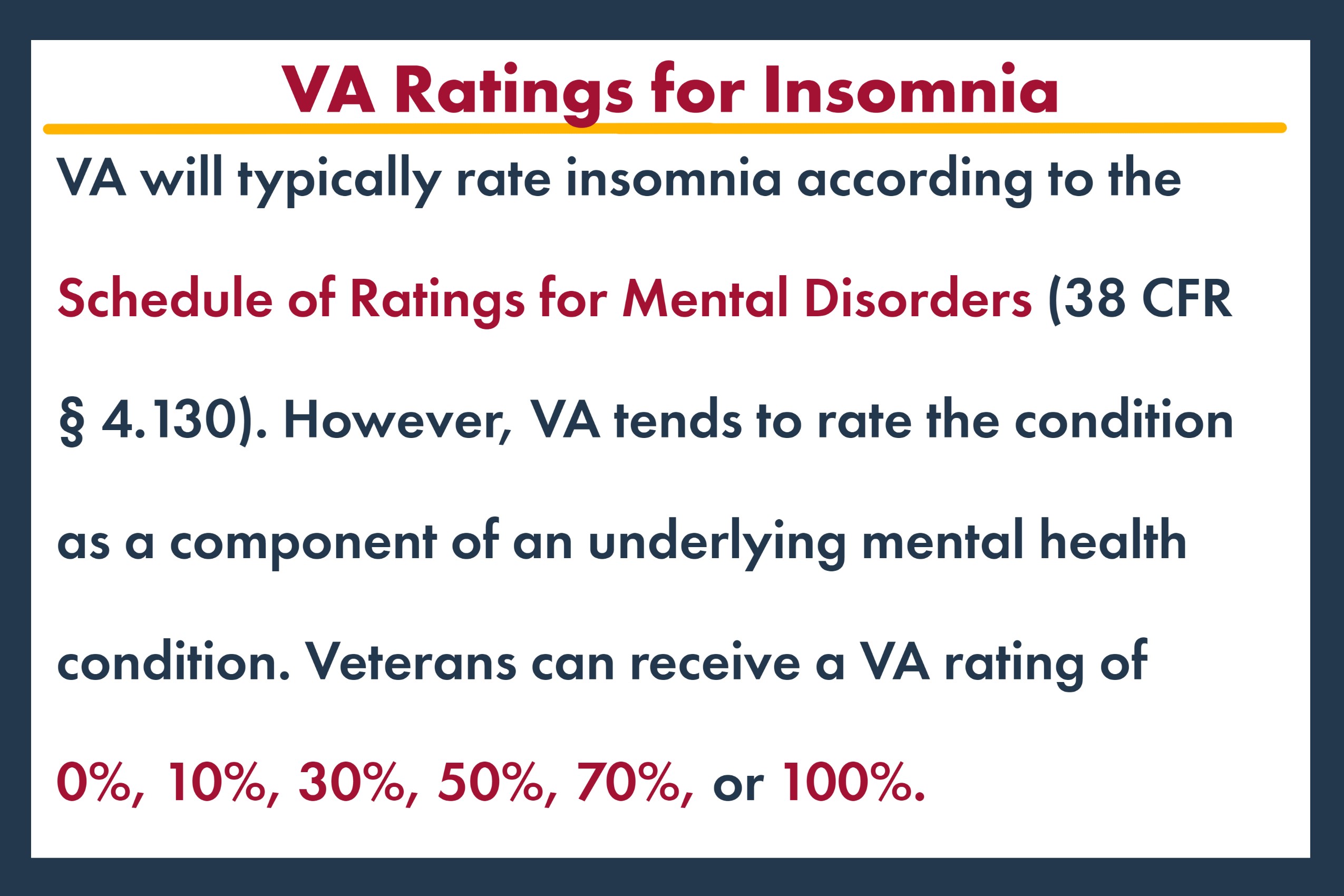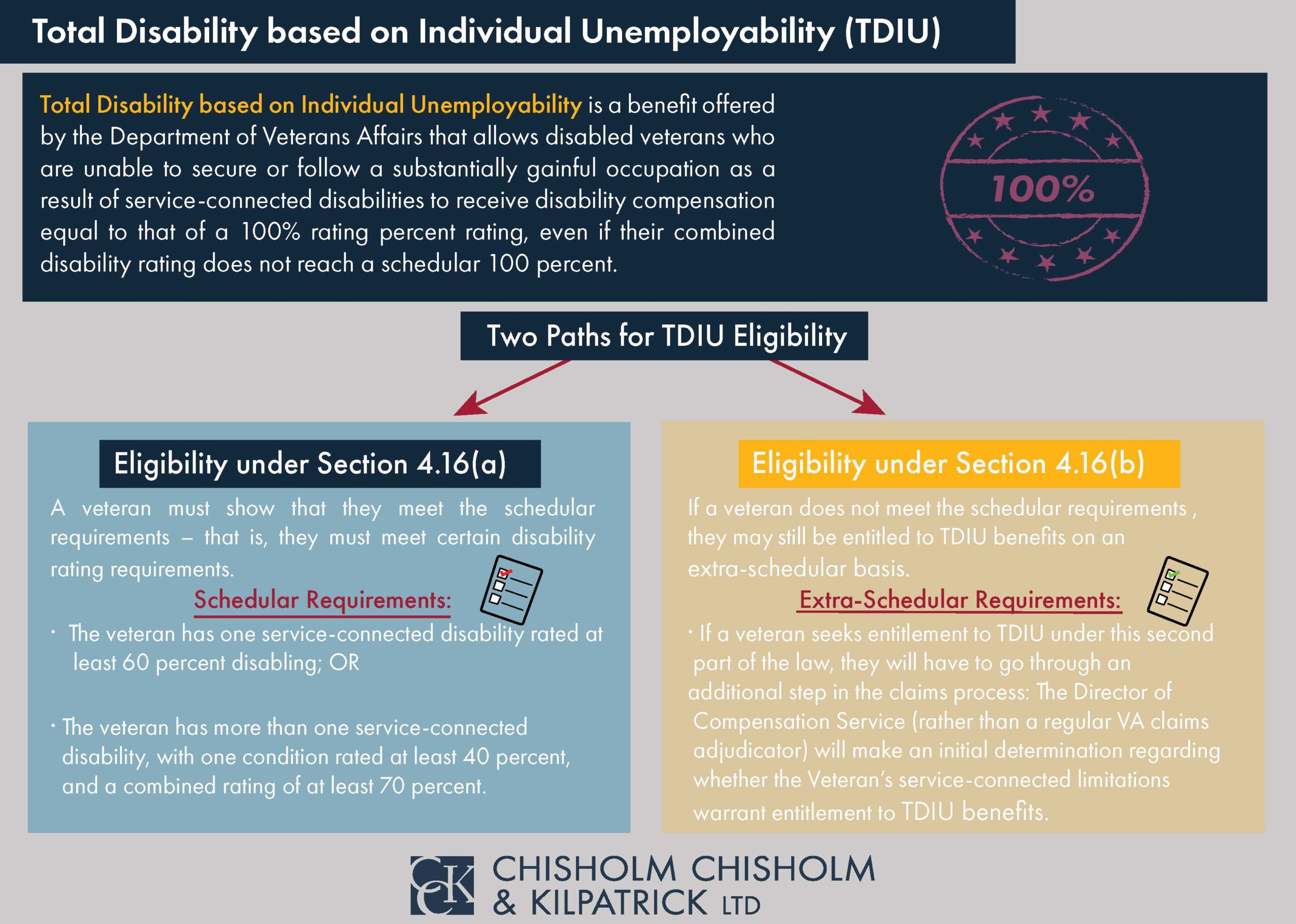Insomnia: VA Disability Claims, Ratings, and Appeals

CCK Law: Our Vital Role in Veterans Law
Insomnia is a sleep disorder involving difficulty falling or staying asleep. The effects can include daytime tiredness, irritability, depression, and attention issues. These symptoms can lead to reduced ability to work and additional medical problems in the form of secondary disabilities.
Insomnia is a common disorder among veterans. According to one study, between 27 and 54 percent of veterans experience insomnia or similar symptoms.
Veterans suffering from service-connected insomnia may be eligible for VA disability compensation. This article will describe CCK tips for proving service connection for insomnia disability claims, the VA disability ratings for insomnia, and other special considerations veterans should know about insomnia and related VA disability claims.

Understanding Insomnia
Understanding the potential causes of insomnia can be essential to a VA disability claim. While the central cause of it is not always clear, some of the most common causes include:
- Psychiatric illness, such as depression, anxiety, and/or PTSD
- Chronic pain from other disabilities
- Chronic stress
- Medications
- Life changes
The two main types of insomnia are acute (short-term) and chronic (long-term).
- Acute Insomnia—This form usually only lasts for a short period of time, likely less than one month.
- Chronic Insomnia—Chronic insomnia is more complex than acute insomnia and occurs several times per week. This form can last at least one month or longer.
Acute insomnia is typically the result of a stressful or traumatic event. Chronic insomnia can also be the result of stress, a traumatic event, life events, or habits that disrupt sleep. Additionally, chronic insomnia may be associated with medical conditions or the use of certain medications.
Specific symptoms of this condition may include the following:
- Difficulty falling asleep at night
- Waking up during the night
- Waking up too early
- Not feeling well-rested after a night’s sleep
- Daytime tiredness or sleepiness
- Irritability, depression, or anxiety
- Difficulty paying attention, focusing on tasks, or remembering
- Increased errors or accidents
- Ongoing worries about sleep
How VA Rates Insomnia Disability Claims
Insomnia does not have its own diagnostic code. VA rates these claims according to the Schedule of Ratings for Mental Disorders (38 CFR § 4.130). VA tends to rate insomnia as a component of an underlying mental health condition. This means that if a veteran has a mental health condition and related insomnia, then they will usually get only one rating, not two.

For example, if a veteran is service-connected for PTSD and suffers from insomnia as a result, then it is likely that VA will consider the sleep condition in its overall evaluation of the veteran’s PTSD.
If the veteran’s insomnia is not caused by a mental health condition, but some other medical issue (e.g., an orthopedic disability), then VA will likely assign a separate disability rating for insomnia based on the Schedule of Ratings for Mental Disorders.
VA rates mental health disorders and insomnia in terms of how much the condition impairs a veteran’s ability to work and carry on relationships. Ratings range from 0-100 percent. Below is a breakdown of the criteria for the rating scale:
- 100%—Presents total occupational and social impairment
- 70%—Occupational and social impairment, with deficiencies in most areas
- 50%—Presents occupational/social impairment with reduced reliability
- 30%—Occupational and social impairment with occasional decrease in work efficiency and intermittent periods of inability to perform occupational tasks
- 10%—Occupational or social impairment due to mild or transient symptoms
- 0%—If diagnosed but symptoms are not severe enough to interfere in occupational or social settings
Establishing Service Connection for Insomnia VA Disability Claims
To receive VA disability benefits for insomnia, veterans must first establish service connection using one of the methods below.
Direct Service Connection for Insomnia
Veterans can be service-connected for insomnia on a direct basis if they can prove their insomnia resulted from or was aggravated by their military service.
To establish direct service connection for insomnia, the veteran must provide proof of the following:
- A current diagnosis of their condition, and
- An in-service event, injury, or illness, and
- A medical nexus linking the condition to the event.
Depending on the circumstances, diagnosing insomnia may involve the following:
- Physical exam—If the cause of the condition is unknown, a doctor may perform a physical exam to look for signs of medical problems that may be related to insomnia.
- Sleep habits review—In addition to asking sleep-related questions, your doctor may have you complete a questionnaire to determine your sleep-wake pattern and your level of daytime sleepiness.
- Sleep study—If the cause of your condition is unknown or unclear, you may need to spend a night at a sleep center where tests are done to monitor and record a variety of body activities while you sleep (e.g., brain waves, breathing, heartbeat, eye movements).
Insomnia may be treated by changing your sleep habits and addressing any issues that may be associated with the condition. However, in more severe cases, cognitive behavioral therapy, stimulus control therapy, relaxation techniques, sleep restriction, and light therapy may be used as forms of treatment.
Presumptive Service Connection for Insomnia
Some conditions are automatically presumed to be service-connected. The veteran must have served at certain places and times.
Under 38 CFR § 3.317, VA presumes that “sleep disturbances” are service-connected for Gulf War veterans. As many as two-thirds of Iraq and Afghanistan military veterans complain of insomnia. VA established the sleep disturbance presumption in response to the number of Gulf War veterans who came home with mysterious illnesses. Doctors found it difficult to diagnose these veterans.
The sleep disturbance presumption can be classified as either of the following:
- A medically unexplained chronic multisymptom illness (MUCMI)
- An undiagnosed illness
Secondary Service Connection
Secondary service connection refers to when an already service-connected condition causes another condition to develop. Veterans can receive a disability rating for each condition.
Below are some examples of secondary conditions to insomnia:
- Chronic pain causing insomnia—If you developed chronic back pain (primary condition) during service and can no longer sleep through the night as a result, you could claim insomnia as a secondary condition.
- Aggravation—Previously existing insomnia made worse by military service or another service-connected disability, if it differs from the natural progression, qualifies as secondary service connection.
Insomnia is often associated with psychiatric disorders such as depression, anxiety, and PTSD. In one study, 92% of active-duty personnel with PTSD reported clinical levels of insomnia. However, VA may treat insomnia in these cases to be a symptom of PTSD rather than a secondary condition.
Insomnia can itself lead to secondary conditions. For example, if a veteran is service-connected for insomnia and then develops depression related to their lack of sleep, they may be eligible for VA disability benefits for depression on a secondary basis.
Secondary disabilities can be especially challenging to prove. If you need assistance, contact CCK for a free case evaluation.
Here are some additional factors that CCK recommends you consider when preparing a VA disability claim or appeal for insomnia. Lay evidence is often overlooked as a way to prove service connection. These are personal statements written by the veteran or someone familiar with the veteran’s situation. There are several types of lay statements. Examples of lay statements for insomnia might include a letter from a spouse who can attest to the fact that the veteran is restless all night and is not sleeping. Moreover, a veteran’s spouse, friend, or coworker can also vouch for how this lack of sleep affects them during the day—i.e., extreme fatigue that diminishes their concentration. VA uses Compensation and Pension (C&P) examinations to help gather more evidence on a veteran’s claimed condition. It does this before issuing a decision and assigning a rating. The exam usually takes place at a VA hospital or with a VA-contracted provider. The examiner will most likely conduct a routine exam, which may include psychological testing. They may also ask questions about your symptoms to better understand how your insomnia connects to your service. Before the exam, the examiner should review the veteran’s C-file. The exam itself usually lasts about 15 to 20 minutes but can range between 5 minutes to several hours. If a veteran’s insomnia is caused by a physical ailment, then a physical exam may also be completed. Importantly, VA does not give the veteran a copy of their report based on the C&P exam unless the veteran asks for it. Therefore, CCK recommends that veterans request a copy of the exam report. That way, the veteran will know if they disagree with the examiner’s assessment, allowing them to challenge unfavorable C&P exams. Lack of sleep can impair a veteran’s productivity, capacity for stress, and ability to work with others. This can have a serious impact on a veteran’s ability to maintain employment. Total Disability based on Individual Unemployability (TDIU) allows veterans who are not rated at 100 percent disabled to be compensated at a 100 percent disability rate anyway when their conditions prevent them from holding “substantially gainful” employment. There are two ways in which a veteran can receive TDIU benefits for insomnia: Since VA rates insomnia over 70 percent, both the above options are feasible paths to TDIU. Also, insomnia does not need to be the only contributing factor to unemployment. If the combination of veteran’s insomnia and other service-connected conditions contribute to their unemployment, TDIU may still be warranted. TDIU claims can be highly complex and time-consuming, so utilizing the services of a VA-accredited law firm or agent may prove beneficial. Veterans may wish to appeal or increase their VA rating. They may wish to do this for several reasons, including: In these types of situations, veterans have options for appealing their rating. Appeals can be difficult and time-sensitive. Also, veterans have likely already experienced lengthy delays waiting for their initial rating. Therefore, the law permits veterans to hire a VA-accredited law firm or advocate to assist with appeals. If you are appealing an unfavorable VA decision related to your claim, contact CCK, the most experienced veterans law firm in the U.S. You may call 401-251-0659 or contact us online.Other Considerations for Insomnia VA Claims
How Lay Evidence Can Help a Claim

What to Expect at C&P Exams for Insomnia
How to Get TDIU for Insomnia
How to Appeal or Increase Your VA Rating
Call CCK Today
About the Author
Share this Post

